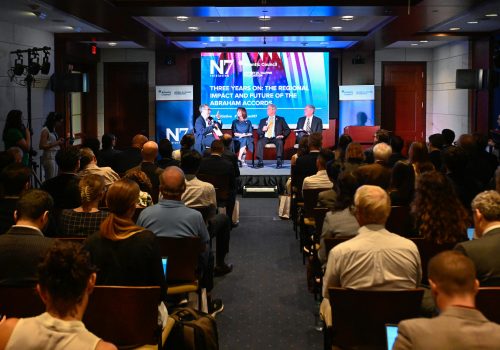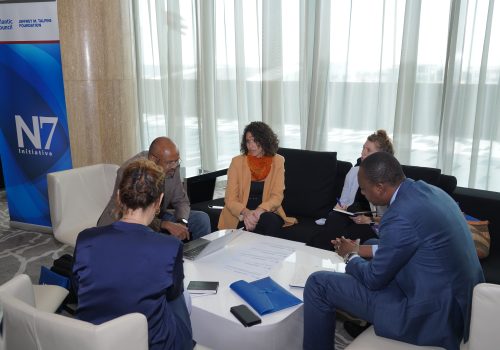Senator Joni Ernst on how to expand cooperation among US allies in the Middle East
The United States “is the glue that will keep the Abraham Accords together,” said Senator Joni Ernst on Wednesday.
Ernst, a Republican from Iowa, provided an optimistic outlook for the future of the Abraham Accords at an N7 Initiative event hosted at Atlantic Council headquarters, only days after the four-year anniversary of the agreement’s historic signing.
“Even though this is a really challenging time in Israel, what you have noticed is that not a single one of the Abraham Accords members has stated, we need to pull out or we shouldn’t remain allied with Israel. So, while there are challenges in the Middle East, the Abraham Accords is solid,” she remarked during the event, which focused on her two new bipartisan bills meant to expand the Abraham Accords agreement in the fields of technology and security.
The first piece of legislation discussed was the Learning Integrated National Knowledge (LINK) Act, announced earlier this week, which is cosponsored by Senator Jacky Rosen (D-NV) and works to connect strategic, operational, and tactical senior commanders between Middle Eastern partners’ armed forces to boost regional security and military readiness.
The second bill, which was unveiled publicly for the first time Wednesday, is the Artificial Intelligence Allied Collaboration for Crucial Operations Research and Development (AI ACCORD) Act, which is cosponsored by Senator Kirsten Gillibrand (D-NY) and aims to increase partner-sharing network capabilities to combat the use of cyber and artificial intelligence tools by Iran and its proxies.
Below are more highlights from the fireside chat between Ernst and former Fifth Fleet Commander John W. “Fozzie” Miller.
The importance of US leadership in the Middle East
- “We need to focus on American leadership. American leadership is the glue that will keep the Abraham Accords together and provide for additional stability in that region,” she argued as she opened the session.
- “We must be present, and if we are not present, we need to have developed those relationships that we can leverage,” Ernst said, “using our friends and allies to cover down when we can’t be present.”
- “I do believe in projecting power forward where we can, but that doesn’t necessarily mean just engaging in kinetic action, or what have you, it is about leadership. It is about being a friend when a friend is needed in the region to provide stability,” she explained.
The success of the Abraham Accords
- “The Abraham Accords has provided opportunity for so many of those nations to come together,” Ernst said. “And it’s not just militarily, it’s also economically. It is educational opportunities for those countries, and they recognize that through the Accords they’ve been brought closer together, and it has created greater stability and prosperity for those nations.”
- Ernst noted that the October 7 Hamas attack on Israel and subsequent war in Gaza have strained diplomatic ties in the region. However, she pointed out that “even though there’s a huge Palestinian influence and Arab influence in many of these other partner nations, none of the Abraham Accords countries have pulled out of the Accords. They will still say they believe in their relationship with Israel. That is incredibly important.”
On the future of regional integration
- “I am very grateful that we have so many wonderful partnerships in the region,” Ernst said. “Some of them are still not partners in the Abraham Accords, and I will say that there are many that will not ever be part of the Abraham Accords, but they will at some point have their own bilateral agreements. So, it may not be the Abraham Accords, but it certainly will be some level of agreement.”
- She also noted that even amid the war in Gaza, Saudi Crown Prince Mohammad bin Salman “and a number of those in leadership at the kingdom are very intent on continuing forward. There has to be resolution in Israel, but they are still intent on moving forward with normalization.”
- She also noted that Saudi Arabia is “working very hard with the Israelis on what some of us will call normalization. The Saudis don’t call it that, but it’s a peace and prosperity plan for their countries.”
The value of military-to-military partnerships
- Ernst said that partners and allies are still important to Republican leaders in Washington. “We all believe in America first, but it’s never America alone. We can’t do this all on our own.”
- When asked about the sensitive nature of military intelligence sharing among Middle Eastern partners through her newly proposed AI ACCORD bill, she remarked “We need to bring them in. I’m all about more is better if they are vetted partners.”
Emily Milliken is the Associate Director for Media and Communications with the N7 Initiative

The N7 Initiative, a partnership between the Atlantic Council and the Jeffrey M. Talpins Foundation, seeks to broaden and deepen normalization between Israel and Arab and Muslim countries. It works with governments to produce actionable recommendations to deliver tangible benefits to their people.
Further reading
Fri, Sep 15, 2023
A Saudi-Israeli deal is not happening just yet. But there are other ways to expand the Abraham Accords.
New Atlanticist By Katherine Golden
Officials convening at the US Capitol discussed the economic and cultural projects that can expand the Accords' impact and spread prosperity in the Middle East.
Wed, May 10, 2023
Saudi Arabia should consider the ‘Just Do It’ strategy for normalizing ties with Israel
MENASource By Richard LeBaron
Acting on one’s terms when pursuing national interests is always a better strategy. Saudi Arabia is completely capable of dealing with Israel on its own.
Tue, May 30, 2023
Cross-border cooperation between Israel and MENA region is key to addressing climate change
MENASource By
There are many opportunities to meet climate-related challenges through cooperation, expertise sharing, and the exchange of ideas in MENA.



Follow the conversation on X, formerly known as Twitter, with @N7_Initiative and @AtlanticCouncil using #N7Initiative